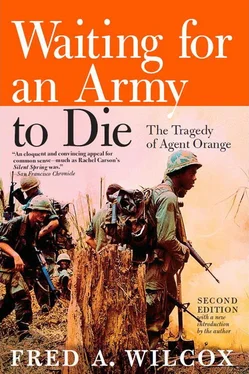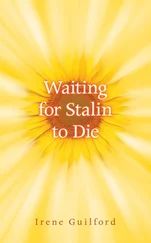“But I can tell you this: without a doubt the number of people who have come forward with problems this far, as astronomical as it may seem, is only the tip of the iceberg. There are so many more out there. So many guys who were superficially wounded in Nam but who refused medical treatment, those guys who saw death and dying and considered themselves lucky and now they look back on it all and if they are sick they just say, ‘What’s a little pain, or numbness in the legs, or violent headaches? I’m alive, aren’t I? So I’ll just hang in there and live with it.’ But most of all they just want to leave the whole Vietnam experience in the closet where they feel it belongs. They just don’t want to be stereotyped any further. They want to believe that they survived the war, and I ask you, can you really blame them? We may be the first army in history that has had to keep fighting for our lives after the war is over.”
The wind is from the south, but bitter, sweeping across the deserted platform in great bone-chilling gusts. Opposite the Long Island Rail Road station is a tavern that once might have been a warehouse—squat, battered, uninviting.
The voice over the phone says, “Just stand by the escalator and face the direction you came from. Look for a blue ’66 Chevrolet.” I pace between the station and the escalator to the elevated platform. The man who arrives a few moments later wears a black beret, and introduces himself as a former “river rat.”
When he was still in high school, Bobby Sutton joined the Naval Reserve, was later assigned to a precommissioning detail in Newport, Rhode Island, and eventually spent a year on the USS Wainwright off the coast of Haiphong.
“We were a kind of ‘radar picket’—that is, positive identification radar air zone,” Sutton explains. “We controlled all the aircraft in the Gulf of Tonkin. They had to come up on our air frequency or they’d get blown out of the sky. Fortunately we didn’t have any combat, just long hours.” Sutton finished his tour of duty and, after only fifty-six days as a civilian, reenlisted. “I was then on the USS Newell , and I would see these little green boats being tested off one of the main piers at Pearl Harbor. And believe me I felt safe on the fantail of that ship. ‘Damn!’ I said, ‘I know where they’re goin’. I’m glad I’m on this ship.’ And lo and behold, just three weeks later I had my orders for training at Mare Island and Coronado, California, at the naval inshore operations training center and was assigned to Rivron 9.”
Assigned to a “zippo monitor,” or flamethrower boat, Sutton cruised the rivers and streams of the Mekong Delta, burning off “dead brush or half-living foliage” to expose enemy bunkers and ambush sites. Sutton estimates that there were over fifty thousand miles of rivers and streams in the Mekong Delta, many of them “laced with bunkers, underground hospitals, VC R&R areas, and spider holes. Did I know some of the areas we were burning had been sprayed with herbicides?” Sutton demands. “Absolutely not. I never even heard of Agent Orange until late 1978, even though I’ve been sick since 1976.”
On the door to Sutton’s basement apartment, where he lives with his wife, Patty, his twenty-one-pound tabby cat, and hundreds of articles, books, scientific papers, government documents, and tapes on the defoliation campaign and the health effects of herbicides, is a sign: THIS PROPERTY PROTECTED BY AN ARMED VIETNAM VETERAN.
“I’ve spent the past two and a half years researching this problem,” says Sutton, leading me into his living room, “and they don’t like me very much at the VA because I tend to be very outspoken about this thing. I just won’t put up with any more of their bullshit. See, I don’t have much education. In fact, when I write to the VA now I put down that I’m a research analyst , which is what I am, really. But they don’t wanna hear about it because they just don’t wanna admit that our government might have killed its own troops.”
We return to the dining room table, and Sutton puts water on the stove for tea. Pointing to one of the many documents stacked and strewn about the table, he says, “This information isn’t top secret, just look at it. I got this stuff from them , from the very people who deny that we are sick. They deny that we’re sick and dying, but their own literature describes the teratogenic and carcinogenic effects of the stuff we were exposed to in Nam.” Opening one of his photo albums, Sutton points to a picture of the zippo monitor on which he served. In the photograph a small craft—Sutton explains the zippos were about fifty-seven feet long—is spraying a riverbank with fire. Another photograph shows two zippo monitors cruising the Mekong Delta, one just a few hundred yards behind the other. Between the two crafts a mortar shell has landed, sending up a geyser. Beneath the photograph a caption reads: “This one missed. The next one didn’t.”
Sutton talks in short bursts of rage, in monologues replete with technical references to the harmful effects of herbicides. The effort seems to exhaust him, and he closes his eyes, stroking the enormous cat that reclines atop the dining room table’s clutter. Regaining his composure, Sutton announces that in a few moments a “Seal” and his wife will be arriving. “I thought you might want to talk to him,” Sutton says, “because he’s sick too, and he can tell you that we’re not just makin’ this whole thing up.”
Joe Naples and his wife Charlotte arrive, and Sutton explains that he and Naples have been living just a few blocks apart for years and only recently discovered that they spent time on the same boat in the Mekong Delta. Mrs. Naples says that she doesn’t really wish to talk, preferring to give her husband support and, when necessary, prompting him with details about the years he has spent fighting the debilitating effects of herbicides on his health. “It’s not unusual,” Sutton explains, referring to Naples’ temporary memory lapses. “You’ll talk to a lot of vets who have this problem. It’s just part of the effect of dioxin on the central nervous system. I sometimes forget what I’m saying or doing, too.”
Naples, who spent three years in Vietnam as a Navy Seal, but “more in the bush than on a boat,” removes his leather jacket and, shoving the sleeves of his sweater to his elbows, exposes tattooed forearms heavily scarred by chloracne and “punch biopsies.” The biopsies, Naples explains, were taken by VA doctors to determine whether or not his fatty tissue contains traces of dioxin. He has had the rashes for many years and when they spread to his arms and legs and the sores broke, covering his skin with a “pussy glaze,” he went to the Veterans Administration for help.
“All that’s left here,” says Naples, pointing to his left forearm, “is scar tissue. They took a skin biopsy, and after about a month I went back to Northport Hospital [Long Island, New York]. The biopsy had been sent to the Bronx to be analyzed and Northport was trying to get the results from there. And the two doctors that were taking care of me in Northport were really honest; they were very interested in it, and one of them called me into her office. So I asked her about the results of the biopsy; and she said she hadn’t gotten any results on the biopsy, and that they couldn’t get the slides. So I says, ‘How come?’ And she says, ‘Joe, there are just three things that possibly could have happened to them slides. One, somebody took the slides and wants to study them some more. Two, they were on their way here in the mail and got lost. Or three, they were conveniently lost, dropped through a hole in the floor.’ And she says, ‘If you want my opinion it was probably the last one. I just feel that this is what happened.’”
Читать дальше











